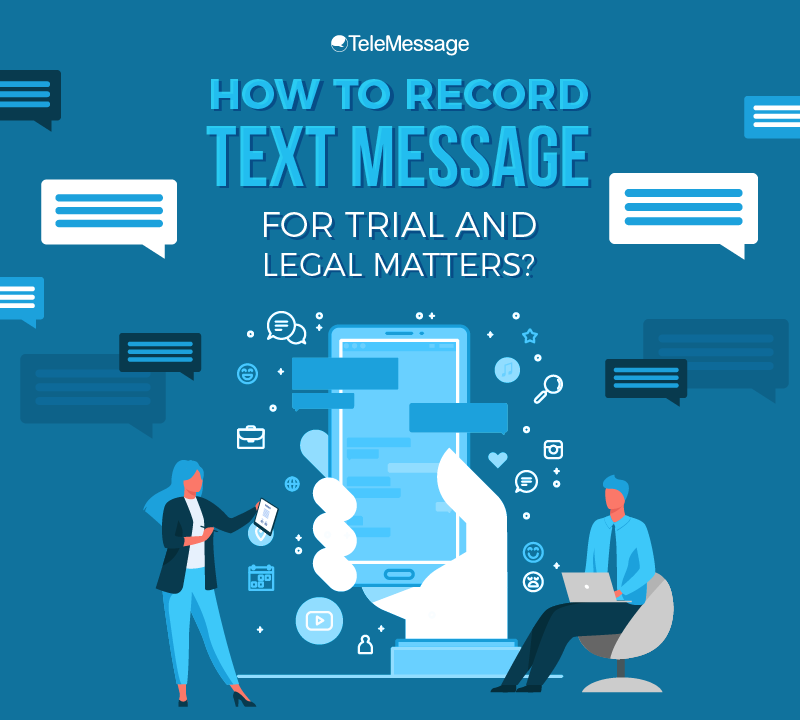Attorneys and clients often require accurate document and print text messages to serve as written records for court, mediation, and legal proceedings. Text messages can serve as excellent records to avoid “he said she said” situations during a litigation. Having a complete record of text messages can also be a key to a faster and more efficient investigations, translating into less cost for all the parties involved in the case
Mobile SMS usage, even between employees and clients, is a growing phenomena. Due to the importance of keeping text messages for use in trial and legal matters, everyone, including private individuals and companies, must know how they can record text messages to ensure that they have a copy available for future referencing.
Different Ways to Record Text Messages
Not all text messages are suitable for legal proceedings. Mobile SMS containing relevant conversations and admissible evidence are the only ones that can be used in court. Steps must be taken to preserve the validity of the text messages properly.
When retaining text messages for trial and legal matters, ensure that all the information necessary to make them suitable in court is preserved. The date and time of the messages are essential information / meta-data that can be used in legal matters and must be retained along with the text message itself.
The contact information of the other party involved in the message should also be recorded.
There are several ways for people to record mobile SMS.
Using Screenshots
One way for people to record their mobile SMS is by screenshots. Capturing screenshots can be said to be the most official way to record iPhone text messages, especially since it’s difficult to backup iPhone messages and keep them in a user-friendly file format.
When backing up messages using screenshots, people should scroll through the entire conversation and capture the relevant parts while ensuring that the time, date, and contact information are visible. The captured screenshot will automatically be saved in the device’s Photos folder. This method is applicable for either iPhones or Androids.
After capturing screenshots, people should organize their screenshots in chronological order to make them easier to locate. Screenshotting text messages is adequate for people with a small number of text messages since the process is quick and easy. Those with a multitude of messages, especially businesses, may have problems not only because it is a tedious and time-consuming process, but because they will also lose most of the messages’ metadata.
Using the Phone’s Built-in Features
Both the iPhone and Android can maintain backups of text messages and other mobile content either locally or in the Cloud. iPhone users can retrieve their files using Finder while Android users can use their phones’ built-in SMS Backup.
Because the phones’ built-in backups store the messages in file formats that are not user-friendly, this method of recording text messages is inadvisable for those who have multiple text messages to retain.
Apps and Programs
Both private individuals and businesses can use various applications to record their messages. Using such apps and programs will allow people to keep backups of their messages. People will likely have to put more effort when using applications since they will have to download, install, and get acquainted with the intricacies of the app to be able to use them effectively.
Establishing Authenticity Through Robust Text Message Archiving
Screenshots and printouts of messages are often not enough to serve as evidence for trial and legal matters, especially since their authenticity can be easily challenged.
The current state of technology allows people to alter the name of both the sender and recipient, the time stamp, and the content itself, making such records unreliable. It’s essential to record a mobile SMS’s metadata as well.
Individuals can resort to applications to record text messages, but companies will need to more securely record messages and produce them in case they get involve in a litigation. To ensure that a business is able to archive relevant text messages and that they are admissible in the court, it will need a robust archiver that can retain mobile SMS as well as their metadata to solidify a case in the court.
TeleMessage’s Mobile Archiver is a unique platform tailor-made to solve eDiscovery issues by allowing firms to capture and archive text messages. An organization’s employees can use TeleMessage to send messages securely as well as archive text messages in Android and iOS devices. Companies will no longer have to back up their text messages to retain such information manually.
Our mobile archiving products securely record content from mobile carriers and mobile devices for a variety of ownership models (BYOD, CYOD, and employer-issued). With our multiple archiving solutions, you can always find the right tools or blend for your requirements:
TeleMessage offers cross-carrier and international mobile text & calls archiving for corporate and BYOD phones. Visit our website today at www.telemessage.com to try our mobile archiving products.

